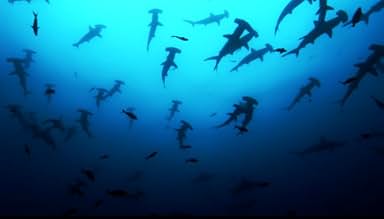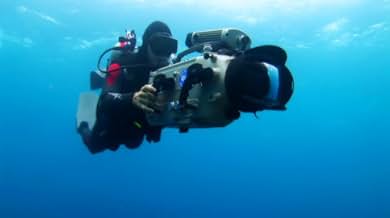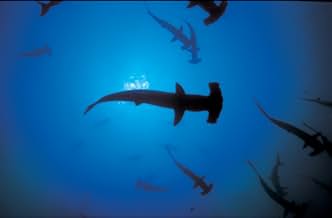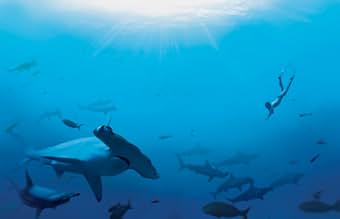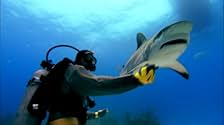IMDb-BEWERTUNG
7,8/10
5086
IHRE BEWERTUNG
Eine Untersuchung über die Bedeutung der Haie für die Ökosysteme und die massive Vernichtung von Haiarten durch den Menschen weltweit.Eine Untersuchung über die Bedeutung der Haie für die Ökosysteme und die massive Vernichtung von Haiarten durch den Menschen weltweit.Eine Untersuchung über die Bedeutung der Haie für die Ökosysteme und die massive Vernichtung von Haiarten durch den Menschen weltweit.
- Auszeichnungen
- 13 Gewinne & 3 Nominierungen insgesamt
Paul Watson
- Self
- (as Captain Paul Watson)
Erich Ritter
- Self
- (as Dr. Erich Ritter Ph.D.)
Boris Worm
- Self
- (as Dr. Boris Worm)
Vic Hislop
- Self
- (Archivfilmmaterial)
Empfohlene Bewertungen
Rob Stewart had made himself a great film.
It's a film that captures the grandeur, misinterpretation, and exploitation of not just sharks but all sea creatures in the oceans.
Among the film's breathtaking footage of kelp forests, massive bait balls, alien seahorses, and of course sharks, the films bearings focus on the absolutely disgusting, unethical, and immoral treatment of wildlife.
Stewart feels like he needs to legitimatize his film by explaining why the deaths of sharks will harm human beings, but really, he doesn't need to. The cruelty he films is more than reason enough to understand that something beyond greed is at work.
I would love to know if there are poachers that aren't just Asians and South Americans. I'm sure there are, but the amount these pathetic men over-fish the oceans is just truly unbelievable. They do nothing but kill.
I'm amazed how many Chinese, a large elitist and delusional lot of them, are so blind to what they're doing. Close-minded ignorance is a staple among many of the worlds fishing communities.
The film is very disturbing, especially for shark and animal enthusiasts, and at least warrants a PG-13 rating. There are numerous scenes of shark-finning and vicious, blank stare poaching of humpback whales to loggerhead turtles.
The film isn't perfect however. Stewart himself isn't that likable, and the film would have probably worked better if it followed someone else around. The soundtrack isn't very good either.
But the film isn't about Stewart, or at least not for me. It's about sharks and all the life under salt water that is being unfairly slaughtered.
It's a film that captures the grandeur, misinterpretation, and exploitation of not just sharks but all sea creatures in the oceans.
Among the film's breathtaking footage of kelp forests, massive bait balls, alien seahorses, and of course sharks, the films bearings focus on the absolutely disgusting, unethical, and immoral treatment of wildlife.
Stewart feels like he needs to legitimatize his film by explaining why the deaths of sharks will harm human beings, but really, he doesn't need to. The cruelty he films is more than reason enough to understand that something beyond greed is at work.
I would love to know if there are poachers that aren't just Asians and South Americans. I'm sure there are, but the amount these pathetic men over-fish the oceans is just truly unbelievable. They do nothing but kill.
I'm amazed how many Chinese, a large elitist and delusional lot of them, are so blind to what they're doing. Close-minded ignorance is a staple among many of the worlds fishing communities.
The film is very disturbing, especially for shark and animal enthusiasts, and at least warrants a PG-13 rating. There are numerous scenes of shark-finning and vicious, blank stare poaching of humpback whales to loggerhead turtles.
The film isn't perfect however. Stewart himself isn't that likable, and the film would have probably worked better if it followed someone else around. The soundtrack isn't very good either.
But the film isn't about Stewart, or at least not for me. It's about sharks and all the life under salt water that is being unfairly slaughtered.
you know, the scary thing is, living in Costa Rica, you can see blatant signs of deals between the Costa Rican Government and the Taiwanese..... Rob Stewart is a genius for bringing this to the attention of the public - something I have been fighting against for a while now. I have just come back from volunteering at Cocos Island, and it breaks my heart to see the long lines set up in supposedly protected waters. The message is out in Costa Rica that it is OK to fish here, and nothing will happen to you if you get caught.... we need more people like "Sea Shepherd", who care, and can see the devastation that this is causing....
I saw this film on an advanced screening, with the director present afterwards for Q&A. The movie has some simply amazing underwater visuals and from what the film maker said was his first attempt at underwater cinematography, and I really must commend him on it. There is great flow to the movie and its very effective in delivering its message. Whether or not you agree with the Sea Shepards Society's methods is secondary to the point of this film. I would highly recommend anyone to go see this film, mind you at times it does seem somewhat graphic but comparatively it's not that bad. While it is a documentary, it is never dry and the film maker's story makes the doc so much more compelling to watch. There are few films that can completely change your view on something, and this would count among them. It highlights sharks in a completely different light and has given me a new appreciation and admiration for them. I full encourage people to go out and see this movie! Note: as cleared up in previous statements, the facts are correct. Sharks are keystone species, and removal of them from the food chain could possibly reek havoc on the rest of the ecosystem, including organisms responsible for the air we breathe. As well, around 50 million sharks are harvested each year, each providing about a pound of shark fin which retails for $200, the math would properly equate into the trillions. I believe the previous commenter misheard or interpreted part of the film.
A great documentary film worth watching for its education value on the topic of the shark-finning industry alone. It goes a couple levels deeper than the usual documentaries you'll catch on discovery channel type shows which made the film quite captivating. Underwater scenes are well shot, although if all you want is some oceanic eyecandy go see 'Blue planet' instead. The real worth of the film comes from some of the undercover and handicam shooting of illegal sharkfin set ups, boat chases, etc...
Director Rob Stewart does a bit too much mugging for the camera which takes some focus away from the sharks, and the way he ends it left me scratching my head for a bit. But despite that, you can tell he is passionate about this topic. His narration and on-screen presence isn't all that hard-hitting, though some of the footage (the finning sequence especially) makes up for it.
Bottom line: As a shark lover, if I had my way I'd make everybody I know watch this movie. I've always felt it a shame that because sharks aren't cute and cuddly they've been left on the back burner of public conservation interest, and I hope it's movies like this that will start to change that.
Director Rob Stewart does a bit too much mugging for the camera which takes some focus away from the sharks, and the way he ends it left me scratching my head for a bit. But despite that, you can tell he is passionate about this topic. His narration and on-screen presence isn't all that hard-hitting, though some of the footage (the finning sequence especially) makes up for it.
Bottom line: As a shark lover, if I had my way I'd make everybody I know watch this movie. I've always felt it a shame that because sharks aren't cute and cuddly they've been left on the back burner of public conservation interest, and I hope it's movies like this that will start to change that.
I had an awfully difficult time getting anyone to see this movie with me. Apparently, a lot of people have issues with sharks. This apprehension was part of the original inspiration for filmmaker, Rob Stewart, to make SHARKWATER. He had been taught his entire life to fear sharks, as have we. The media vilifies sharks every so often to remind us that they are not our friends. It isn't safe to get in the water after all. Haven't you all seen that movie with sharks where they eat all the innocent people? It's as if we have never fully recovered from JAWS. In his career as an underwater photographer, Stewart discovered that these fears are almost entirely unfounded. He could swim with the sharks and get close enough to touch them if he showed them that he did not fear them and that they had no reason to fear him. And so he set out to make a documentary that would demystify our notions that sharks are perversely obsessed with the killing of human beings. What he would discover is that we as humans have already launched a full-scale retaliation against our sworn enemy.
Stewart's experience as an underwater photographer does not go to waste in this breathtaking film. Stewart's ocean is one of tranquility and warmth. Over time, it has become his sanctuary and he presents the environment to his audience with the same feeling of security that he claims to get from it. Though he was once very much like a fish out of water, Stewart has found a new home in the ocean and his neighbors don't seem to mind him at all. The imagery of SHARKWATER was what originally drew me to the film and it does not disappoint. Schools of fish of so many different varieties swim past and mingle with each other that the screen becomes a mélange colour and movement that is at times dizzying and hypnotic. And though those same fish scatter when the sharks enter the frame, Stewart does not. Instead, he swims towards them and in one instant you see how two species can forget their supposed feud between them by letting their fear of the unknown fall away. For a moment, two world collide to create an unexpected harmony.
This only makes what follows all the more painful. Stewart's shoot took an unforeseen turn when he joined the crew of a militant oceanic watchdog ship that makes it their mission to ensure international treaties protecting the rights of ocean dwellers are upheld. Before long, Stewart and the crew are involved in an international scandal over shark-finning. In some countries, like Japan, shark fin soup is considered a delicacy that when served affirms one's social status. It is popular at massive weddings and can cost upwards of a hundred dollars in a restaurant. According to Stewart, shark fin trading on the black market is only second to drug trafficking. Although the statistic seems a bit skewed, there are still billions of dollars involved in the trade. For the first time in the 450 billion years that sharks have been on this planet, there are certain species of sharks that are facing serious threats of extinction. Once again, human beings plow through other life in pursuit of the almighty dollar without acknowledging the long term ramifications. See, the planet consists of two-thirds water and this water contains a lot of plankton that produces 70% of the planet's oxygen. The ocean is filled with fish that survive on plankton. The shark is the ocean's leading predator of these plankton eaters. If we kill off all the sharks, then the other fish will have free reign over the plankton, which means a diminished production of oxygen for us to breathe. Why do we always assume that our actions have no consequence? And why do we always put money ahead of preservation? You can't spend money if you can't breathe.
All of this ecological unrest for soup. Shark fishers remove the fins of the shark, which make up 5% of the shark's body, and throw the shark back into the ocean to die. Stewart and his crew go undercover into the illegal industry to give weight to their accusations. As you stare out at rooftops covered with shark fins drying the sun, you cannot help but be horrified at the sheer size of the operation. SHARKWATER invites you to make friends with the enemy and to see how we as humans are so much worse to sharks than they are to us. The mirror is turned to expose who is the more evil predator and its mouth is not home to sharp jagged teeth but rather to a smiling face sipping down its soup. Sadly, SHARKWATER will not be seen by as many as it should as people prefer their sharks as foe instead of friend. Bring on JAWS 5!
Stewart's experience as an underwater photographer does not go to waste in this breathtaking film. Stewart's ocean is one of tranquility and warmth. Over time, it has become his sanctuary and he presents the environment to his audience with the same feeling of security that he claims to get from it. Though he was once very much like a fish out of water, Stewart has found a new home in the ocean and his neighbors don't seem to mind him at all. The imagery of SHARKWATER was what originally drew me to the film and it does not disappoint. Schools of fish of so many different varieties swim past and mingle with each other that the screen becomes a mélange colour and movement that is at times dizzying and hypnotic. And though those same fish scatter when the sharks enter the frame, Stewart does not. Instead, he swims towards them and in one instant you see how two species can forget their supposed feud between them by letting their fear of the unknown fall away. For a moment, two world collide to create an unexpected harmony.
This only makes what follows all the more painful. Stewart's shoot took an unforeseen turn when he joined the crew of a militant oceanic watchdog ship that makes it their mission to ensure international treaties protecting the rights of ocean dwellers are upheld. Before long, Stewart and the crew are involved in an international scandal over shark-finning. In some countries, like Japan, shark fin soup is considered a delicacy that when served affirms one's social status. It is popular at massive weddings and can cost upwards of a hundred dollars in a restaurant. According to Stewart, shark fin trading on the black market is only second to drug trafficking. Although the statistic seems a bit skewed, there are still billions of dollars involved in the trade. For the first time in the 450 billion years that sharks have been on this planet, there are certain species of sharks that are facing serious threats of extinction. Once again, human beings plow through other life in pursuit of the almighty dollar without acknowledging the long term ramifications. See, the planet consists of two-thirds water and this water contains a lot of plankton that produces 70% of the planet's oxygen. The ocean is filled with fish that survive on plankton. The shark is the ocean's leading predator of these plankton eaters. If we kill off all the sharks, then the other fish will have free reign over the plankton, which means a diminished production of oxygen for us to breathe. Why do we always assume that our actions have no consequence? And why do we always put money ahead of preservation? You can't spend money if you can't breathe.
All of this ecological unrest for soup. Shark fishers remove the fins of the shark, which make up 5% of the shark's body, and throw the shark back into the ocean to die. Stewart and his crew go undercover into the illegal industry to give weight to their accusations. As you stare out at rooftops covered with shark fins drying the sun, you cannot help but be horrified at the sheer size of the operation. SHARKWATER invites you to make friends with the enemy and to see how we as humans are so much worse to sharks than they are to us. The mirror is turned to expose who is the more evil predator and its mouth is not home to sharp jagged teeth but rather to a smiling face sipping down its soup. Sadly, SHARKWATER will not be seen by as many as it should as people prefer their sharks as foe instead of friend. Bring on JAWS 5!
Wusstest du schon
- VerbindungenFeatures Der weiße Hai (1975)
- SoundtracksRoads
Written by Adrian Utley, Beth Gibbons and Geoff Barrow
Performed by Portishead
Published by Chrysalis Music (ASCAP)
Courtesy of Polydor Ltd.
Under license from Universal Music Canada Inc.
Top-Auswahl
Melde dich zum Bewerten an und greife auf die Watchlist für personalisierte Empfehlungen zu.
- How long is Sharkwater?Powered by Alexa
Details
Box Office
- Bruttoertrag in den USA und Kanada
- 850.920 $
- Eröffnungswochenende in den USA und in Kanada
- 37.140 $
- 30. Sept. 2007
- Weltweiter Bruttoertrag
- 1.658.393 $
Zu dieser Seite beitragen
Bearbeitung vorschlagen oder fehlenden Inhalt hinzufügen


